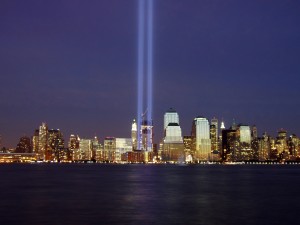Twelve years ago, I was living in Fairfield, California, one month away from completing a two-year mission for The Church of Jesus Christ of Latter-Day Saints. It was a Tuesday morning and I was sitting in a weekly meeting that was not starting on time. As the minutes dragged on, the missionaries grew restless, wondering where our leaders were. I wondered too.
After what seemed an eternity, the district leaders finally walked in. The meeting started quickly, but didn’t last very long. The district leaders had just talked with our mission president, who informed them that a terrible tragedy had occurred that morning. Airplanes had crashed into the Twin Towers of the World Trade Center in New York City and terrorists were involved.
As missionaries, we weren’t allowed to watch television or use the Internet, but it was impossible to not see the footage. Every door we knocked on, every house we visited, had the television tuned to the news. Standing in the home of a family we were teaching, Elder Barnes and I watched the towers collapse as the weakened structures could no longer support their own weight.
I’ve heard a lot of talk over the years about how this tragedy brought people together and brought many back to religion. All I can remember is the hate. Over the next month, I saw people refuse to shop at convenience stores and buy from ice cream trucks because the clerks and drivers were of Middle Eastern descent. One man I met said he was going to buy a gun, climb to the top of a tree, and shoot any Islamic people who came within a block of his house. I felt that at any moment things could erupt into a witch hunt rivaling that which confined many innocent Japanese Americans to concentration camps sixty years earlier.* I guess I should be grateful that the terrorists redirected people’s attention from their hatred of Mormon missionaries, but all I feel is sadness for those Americans persecuted because of the actions of a minority group of radicals.
We spent most of that day knocking on doors, but everyone was too busy watching the news reports to listen to a couple of kids talk about religion. When we asked for a drink of water, one man slammed the door in our faces. As we turned to leave, the door reopened and his wife handed each of us a glass. She apologized for her husband, saying, “We don’t treat people that way.” Years later, I no longer remember her face, but I will never forget her kindness.
* Coincidentally, the Topaz War Relocation Center in Utah was opened September 11, 1942. During its three years of operation, Topaz grew to over 9000 people, becoming the fifth-largest “city” in Utah at that time.

